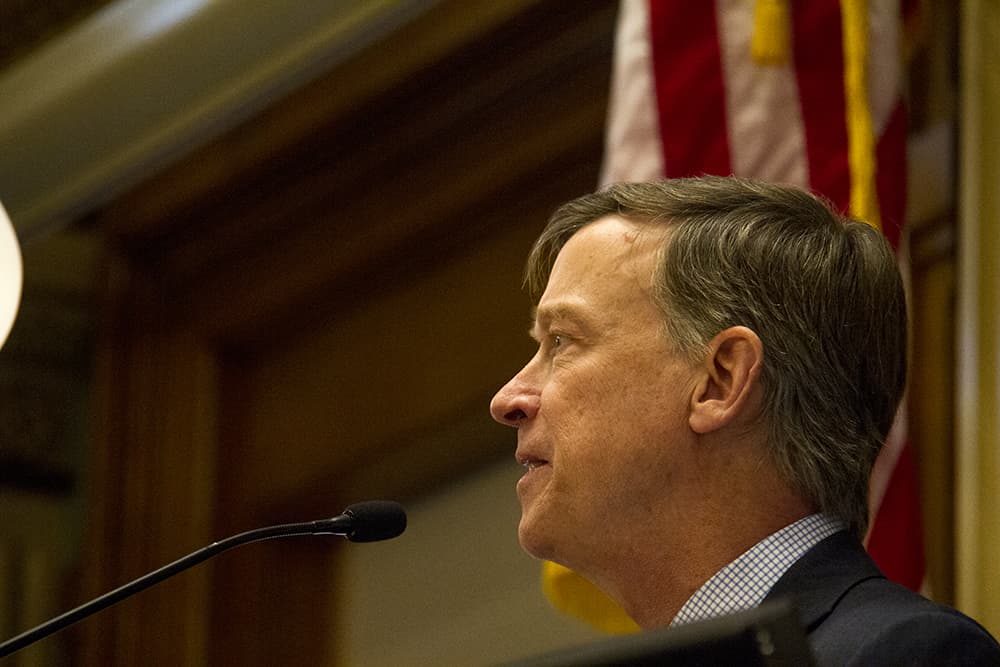After a week of will-he, won't-he, Gov. John Hickenlooper landed on the latter. He will not call lawmakers back for a special session to try to put together a transportation funding package.
"These last nine days, we've talked to a lot of stakeholders," Hickenlooper said Friday. "We wanted to reassess whether it would be worth the effort to bring everyone back. Our conclusion is that it really isn't worth calling a special session. The political landscape has not shifted."
Those stakeholders included lobbyists and members of the transportation industry, but Senate President Kevin Grantham said he is not aware of the governor talking to the Senate Republicans whose concerns about raising taxes ultimately killed the bill that he and Speaker of the House Crisanta Duran supported
The governor did not talk to Grantham, who wiled away the days waiting for an announcement by making funny videos.
Hickenlooper said he didn't want to waste Grantham's time when Grantham made his own position on a special session -- that there's no point -- clear the day after the session ended, but he did talk to House Democrats and Senate Republicans, as well as others.
He was also considering a special session to look at ways to reduce health care costs and fund the Colorado Energy Office, which was a last-minute victim of disagreements between Democrats and Republicans about whether to reorient it to be less focused on renewable energy.
Grantham said he was pleased with the decision not to hold a special session, but he called it "mysterious" that it took so long to reach it.
"All we need is a good rationale and a good reason, if we're going to spend taxpayer dollars to bring everyone back in," he said. "We need something that would motivate us to get behind it, that we could support. Without word one on what that would be, it was a bit unfathomable to me."
Duran said she would have liked another chance to work out a transportation deal, as well as address the health care and energy issues that got left on the table. However, the governor's decision was probably appropriate.
"If we could have gotten a different result, it would have been time well spent, and at this point, I'm not sure that's a possibility," she said.
This makes it that much more likely that voters will see a citizen initiative on the ballot.
A group that includes the Colorado Contractors Association has submitted a number of possible ballot measures, and it's not clear which version might end up on the ballot in 2017 or 2018, but in a statement, Tony Milo, the head of the association, said the status quo is not tenable.
“After a grueling, hard-fought, legislative session, we may be gluttons for punishment, but we would have gladly invited a second bite at the apple to address our transportation infrastructure needs and refer a measure to the voters,” said Milo, a member of the FixItCO coalition.
“While lawmakers deserve praise for setting aside partisan politics and passing SB 267, unfortunately, the allocation for infrastructure in SB 267 is only a small fraction of the $9 billion the Colorado Department of Transportation has identified as necessary to address our infrastructure backlog, not to mention the backlog in local transportation needs," he continued. "In other words, the SB 267 dollars will not make a dent in the growing congestion and safety concerns that frustrate drivers and put lives at risk."
Hickenlooper, Duran and Grantham all said versions of the same thing: They'll have to look at what comes forward and whether it's something they can support.
Any tax increase is likely to be a tough sell with voters, and Michael Fields of Americans for Prosperity, whose strong opposition helped kill the transportation deal, taunted the FixItCO Coalition on Twitter.
Fix Colorado Roads, a group that represents chambers of commerce and economic development organizations, also expressed disappointment that there won't be a special session.
"We were hoping for another opportunity this year to reach a legislative solution and find a responsible way to fund and finance Colorado’s failing roads. We are disappointed that the door is closed with the Governor’s recent announcement,” Sandra Hagen Solin, a spokeswoman for the group, said in a statement. "Our group will keep the conversation moving forward with legislative leaders and voters. Nine out of 10 voters agree that Colorado’s roads are in ‘desperate need of repair.’ It is not enough for our state’s policymakers to talk about solving our state’s transportation crisis. They must do it."













